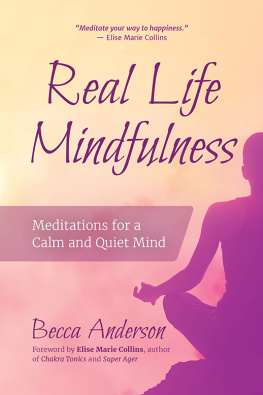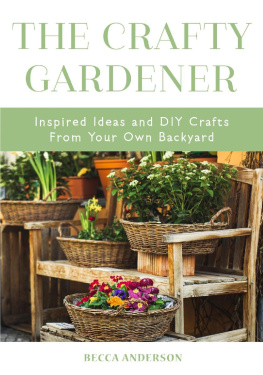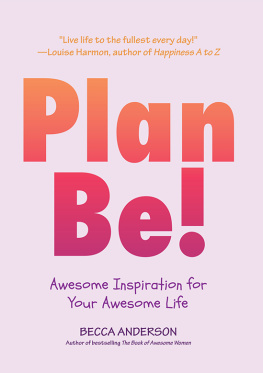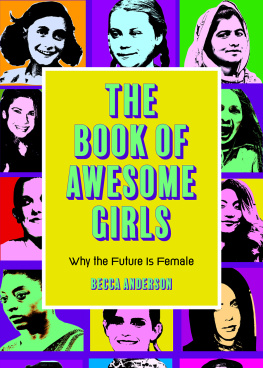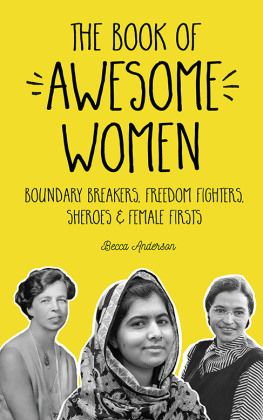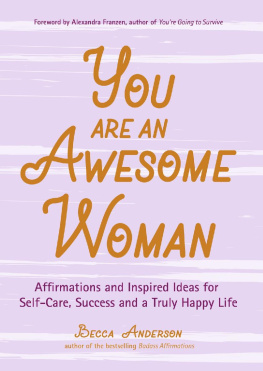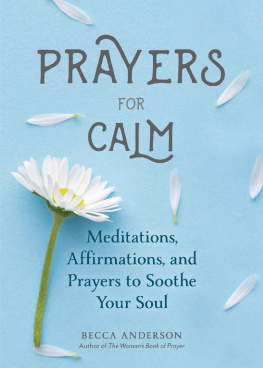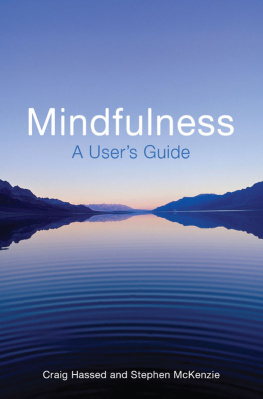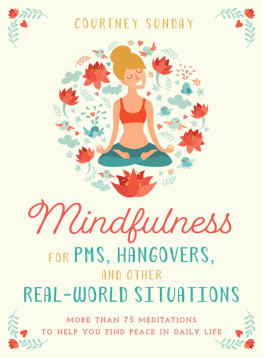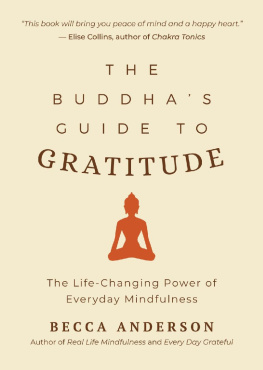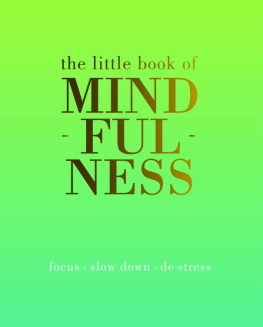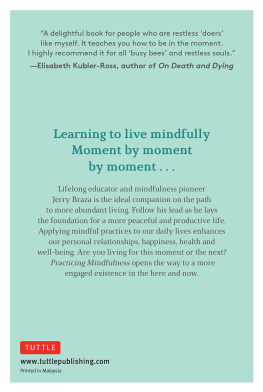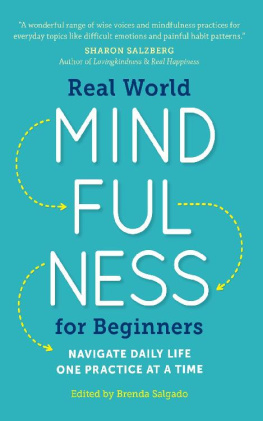Real Life
Mindfulness
Also By Becca Anderson
Think Happy to Stay Happy: The Awesome Power of Learned Optimism
Prayers for Hard Times: Reflections, Meditations and Inspirations for Hope & Comfort
The Book of Awesome Women: Boundary-Breakers, Freedom Fighters, Sheroes, and Female Firsts
Every Day Thankful: Blessings, Graces and Gratitudes
Real Life Mindfulness:
Meditations For a Calm and Quiet Mind
Becca Anderson

Mango Publishing
Coral Gables, FL
Copyright 2018 Becca Anderson.
Published by Mango Publishing Group, a division of Mango Media Inc.
Cover Design: Roberto Nunez
Layout & Design: Jermaine Lau
Mango is an active supporter of authors rights to free speech and artistic expression in their books. The purpose of copyright is to encourage authors to produce exceptional works that enrich our culture and our open society.
Uploading or distributing photos, scans or any content from this book without prior permission is theft of the authors intellectual property. Please honor the authors work as you would your own. Thank you in advance for respecting our authors rights.
For permission requests, please contact the publisher at:
Mango Publishing Group
2850 Douglas Road, 3rd Floor
Coral Gables, FL 33134 USA
For special orders, quantity sales, course adoptions and corporate sales, please email the publisher at or +1.800.509.4887.
Real Life Mindfulness: Meditations for a Calm and Quiet Mind
Library of Congress Cataloging-in-Publication has been applied for.
ISBN: (paperback) 978-1-63353-531-2 (ebook) 978-1-63353-532-9
BISAC category code OCC010000 BODY, MIND & SPIRIT / Mindfulness & Meditation SEL032000 SELF-HELP / Spiritual
Printed in the United States of America
I dont personally believe in an arrived stated of enlightenment. I feel that being human is a constant practice of return. We have moments of clarity, and then were confused. We have incredibly sensitive periods of being awake and then were numb. Being human is a very universal and a very personal practice of learning how to return when we cant get access to what we know.
Mark Nepo
Contents
Conclusion: Get Out of Your Head and
Back into Your Heart
People need mindfulness more than ever. The world has grown increasingly complicated and interdependent. The pace of life has accelerated tremendously and continues to move more and more quickly. Most people crave an antidote. Mindfulness provides a remedy. The practice of mindfulness simplifies, creates calm, and offers new ways to navigate the churning, uncharted waters of the digital age. What exactly is mindfulness, one may wonder. Although its a popular term, pinpointing the exact definition of mindfulness can be difficult. Do I have to get up early? Must I do some special ritual? Mindfulness remains and has always been something simple, yet quite profound. Mindfulness in its essence means paying attention.
Mindfulness appears to be a straightforward process. Essentially it is. Yet, because life holds enormous potential for complication, continued practice and mastery of mindfulness can be challenging. There are so many distractions that can make paying attention a problematic venture, and therein lies the paradox of mindfulness. There are mundane distractions, such as to do lists, a pile of laundry, or a pebble in your shoe. There are more monumental distractions, such as natural disasters, death, accidents, or other big life changes. Mindfulness as a practice offers tips and tools to stay present, focused, and relaxed through it all, big and small.
The daily requirements of mindfulness depend on the conditions of the day. Just as a surfer must stay present, prepared, and ready to jump into action to catch a wave, a mindfulness practitioner must remain poised and ready to move with whatever influx life presents. Sometimes the waves are small, so we need to train our attention so we dont become bored. Sometimes the waves seem huge and impassable. In that case, we may need to focus on our own inner fear to get through the surf conditions of the day. Mindfulness offers us ideas and insights for staying present and alert through it all.
Mindfulness is both a state of mind and a skill.
Renee Metty
Mindfulness can refer to paying attention to the present moment, or it can describe meditation, as in mindfulness meditation. Open your eyes to practice mindfulness as a state of mind or close your eyes to develop the skill of meditation.
With our eyes shut, we practice mindful meditation. Mindful meditation can be practiced sitting in silence and focusing on the breath. Thoughts interrupt the practice of doing nothing; the meditator continues the practice of staying present and not distracted. Mindful meditation helps a person to harness the mind and sharpen focus, and it prepares one for staying present and attentive in daily life.
Think of the following metaphor. If life is a big party, the meditation part becomes the pre-party preparation. We clean, we organize, we plan the activities and the guest list. We get ready for the big party. Meditation becomes a way to prepare to be in the present moment for the party. We organize, sort through our thoughts, and clear the mind to make space for life.
Then on the day of the party, we engage in what I call everyday mindfulness. We practice being present and engaged, having fun or maybe not so much fun as the party unfolds in whatever way it unfolds. We stay awake and fully connected.
Everyday mindfulness doesnt require shutting your eyes. All thats needed is the focus to engage in whatever is happening around youto see, feel, smell, notice your body, taste, and listen. You can engage in mindful walking, dancing, gardening, or just watching clouds float by. Everyday mindfulness might be washing the dishes and feeling the warm water, the soap, the sponge, the grime and grease. Its a reckoning and surrender to the mundane.
In goal-oriented activities, mindfulness means paying attention in the moment and letting go of the outcome. For this reason, more and more professional and nonprofessional athletes are embracing the tenets and philosophies of mindfulness. We are better players in sports and in life when we live mindfully. The Golden State Warriors won two NBA championships in part by embracing a mission based on mindfulness.
My early struggles sent me in search of something called mindfulness even though I had no idea what I was looking for. I grew up in a family of what I describe as nutty professors, deep thinkers who liked to debate and escape into the books they read. During our family meals, everyone had a book, magazine, or newspaper in their hands. Rather than engage in conversation, my brother and parents preferred the company of literature. Even though this was many decades ago, the behavior I saw was remarkably similar to twenty-first-century behavior. Many people engage with their digital devices at the dinner table. I recall feeling confused by this behavior. I longed for connection and presence, but I had no idea what I was looking for and I was not sure how to find it. I remember once snapping a photo of my family reading together at the dinner table. I wanted to document them all paying attention to the printed word instead of a lively conversation or even the food they ate. What I experienced as a child was very different from what I saw around most family tables at the time.
Although I didnt know anything about mindfulness, I recognized my need for something different. It wasnt that I didnt want to read or learn. I just wanted connection, focus, and attention from my family of origin as a child, and later as a teenager. I craved presence and connection. Although I know my family members loved me, focusing on the attentional moment was not a priority, especially during mealtimes.
Next page
